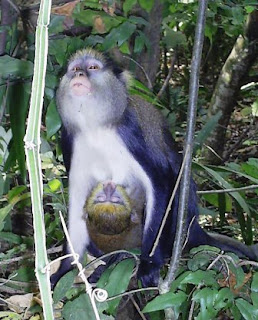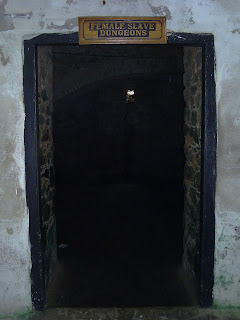So, I'll preface these comments by saying that Burro is a privately held company. Although there is a company blog, it doesn't tell everything and neither will I - but I can definitely give you some idea where we are in the process and how it's going.
Here is the general idea, for those who don't want to dig bag through the blogs for the original overview - or for those who thought the first explanation lacked appropriate detail.
BACKGROUND:
First, you must know that 69% of Ghanaians do not have electricity in their homes AND it get's dark every night, year round, by 6:30 PM.
THE PROGRAM:
We rent the use of rechargable batteries. That's it. We have AA-size rechargable cells that can be used as AAs or can be inserted into a plastic adapter and used as a D-size battery - this is what most clients do.
The way the program works is: a client rents the use of a rechargable battery for one month. The rental occurs through an agent who is generally located right in the village or neighborhood - or quite nearby. For the entire month, anytime the battery loses power (the local terminology is: the battery "falls"), the client can take the battery back to the agent and the agent will give him or her a fresh battery with no additional cost.
 Twice weekly, we travel a delivery route. Map #1 shows where we are within Ghana and Map #2 shows yellow dots where we have agents. The blue line is the planned delivery route along which we are expanding. Right now we don't go all the way around. As the business expands there will likely be two additional loops served by the Koforidua branch.
Twice weekly, we travel a delivery route. Map #1 shows where we are within Ghana and Map #2 shows yellow dots where we have agents. The blue line is the planned delivery route along which we are expanding. Right now we don't go all the way around. As the business expands there will likely be two additional loops served by the Koforidua branch.In any case, on route day, agents meet us at the route point closest to them (agents who
 are close enough to K'dua come to the office) and exchange used (fallen) batteries for fresh (recharged) batteries. We take the used batteries back to the branch and recharge them.
are close enough to K'dua come to the office) and exchange used (fallen) batteries for fresh (recharged) batteries. We take the used batteries back to the branch and recharge them.At the end of one month, the client renews the rental for another month or returns the batteries.
OUR OBJECTIVES:
We are definitely in a pilot phase with Koforidua as the pilot branch. Our objective is to test the concept, figure out how to do it profitably and sustainably, and develop a roll-out plan to have up to 50 branches throughout Ghana.
SUCCESS SO FAR
We have changed the concept and the operational approach several times in the last three months. This is expected during a pilot, and we will likely change several things again before we have a standardized method for everything, but there are a few things we seem to have settled on:
1. Customers love the offering. They are saving money AND using their battery operated devices more than they could ever afford before.
- For instance, if you remember the days of the Walkman, you recall how quickly they went through batteries. Our customers have the same issue with radios, tape players, flashlights, table lamps, etc.
- Because it gets dark early (from a light standpoint, villages with no power are like camping in the middle of nowhere), and because radio is the only source of entertainment and news, all these devices are used a lot. Previously if a client used a radio carefully, he might make the batteries last one week.
- Batteries - at least the very cheapest, crappiest ones that are highly likely to leak and ruin the devise - cost about 25 pesewa each. So that means, even using the battery carefully, a client would be spending at least 1.00 cedi per month for each low-end battery. With Burro, he may actually spend less for a very high quality, high capacity battery, and can exchange the battery every day if he needs to.
- Farmers take their radios to the field and work longer or with more energy - in the same way you might crank up the tunes while doing housework, except that, for the farmer, it means more crops, better yield, better family nutrition, and increased income.
- Shopkeepers are open longer hours and/or need not contend with the cost and nasty smell of kerosene
- Hunters (nocturnal - rodents and snails) find more game and can provide for their families AND have some left over to sell
- Mothers feel more confident and secure with a "porch" light in the evenings
- Children can see to do homework
- etc.
3. There are many honest and conscientious individuals who would like to be agents
- Although most of them are not used to business processes and requirements, our agents are very responsive when we try new forms (remember, no computers either - all paper record keeping) or change the way they have been tracking things.
- Lost batteries has been only a minor issue and the agents show genuine concern when a battery is lost.
- Agents have learned along with us and I see them changing their approaches to incorporate their learnings, which is very exciting
- Although GMT is jokingly called Ghana Maybe Time, our agents are showing up more or less on time for their assigned route meeting times
4. The route seems to be the best way to collect used and distribute fresh batteries
- Customers are refreshing their batteries on average about every 5 days - more in some villages than others
- Asking all agents to come to the office (our first idea) turned out to be cost prohibitive for the agents - some villages require both a taxi and then a trotro (passenger van) to reach Koforidua, which can cost up to 2.00 cedis each way
LESSONS:
There are a number of things we have learned, some good and some challenging, but all useful.
1. Despite a high "official" unemployment rate, people are doing many things to care for their families and "make a living". Therefore, few of our agents are doing this full time. They have farms, shops, jobs (two teachers), and so forth.
- That means we'll need more agents to achieve the rental numbers needed for viability
- That means the route will take longer (more agents to meet, reconcile, and collect)
- Cost per agent to execute the route is higher
2. Many agents seem to be happy with "enough" income. While there is an awareness of the "stuff" they could buy, it is not part of the culture to want and buy everything you see. Many people hardly ever leave their villages anyway, except to travel to a relative's funeral, so all they really need are the "must haves".
- This means we'll need more agents... as well as the other two bullets above
3. When tracking is all manual and paper-based, LESS is more. Also, it's more of a "verbal/memory" culture, than a writing culture. If we ask an agent about any client, chances are he will know how many batteries the customer has, where he lives, if he's due, etc. Collecting addresses, for instance, was not adding value - usually it just said "On the Nkurakan to Asesewa Road" or something similar, which wasn't useful anyway. But the agent knew exactly where to find the customers (and our batteries), which was the important thing.
- This means we can dramatically reduce the amount of data we are collecting and simplify the amount of data the agent has to record.
- This means training and roll-out to new agents will be easier .
- This means we may have less data for management reporting and will have to make do with summary information at the agent and branch level.
- This means we can't add a lot of additional items. The paperwork would be a nightmare (we tried it, see below for details)
4. Our program takes a long time to explain and selling is a skill that must be taught. Most of our agents were jumping right to "here's a battery for XX pesewa". It took a lot of time to get them to ASK questions of the client first - do they use batteries? how many? in what sorts of devices? etc.
- This means training and roll-out to new agents will take longer
- This means we will need to spend more time in the field "modeling" the right sales techniques
5. This is an ownership culture. People want to own things, not rent them. They are catching on with the batteries that what we're "renting" is the charging service along with the battery. But
So, I'm sure I've forgotten a bunch of stuff that would be interesting, but on the off chance it's more interesting to me than to you, I'll stop now and give all that some time to marinate (name that movie). All in all, it is a challenge and there is never a dull moment and we are constantly hashing and re-hashing. Who knows, having spent 2 hours at the Social Security office and 4 hours at the IRS today, maybe it'll be the taxes and bureaucracy that are the most challenging!
XO

























 having his books not tally that any instruction he may have been given about the oburoni women in the white truck was far from the top of his mind.
having his books not tally that any instruction he may have been given about the oburoni women in the white truck was far from the top of his mind. 























